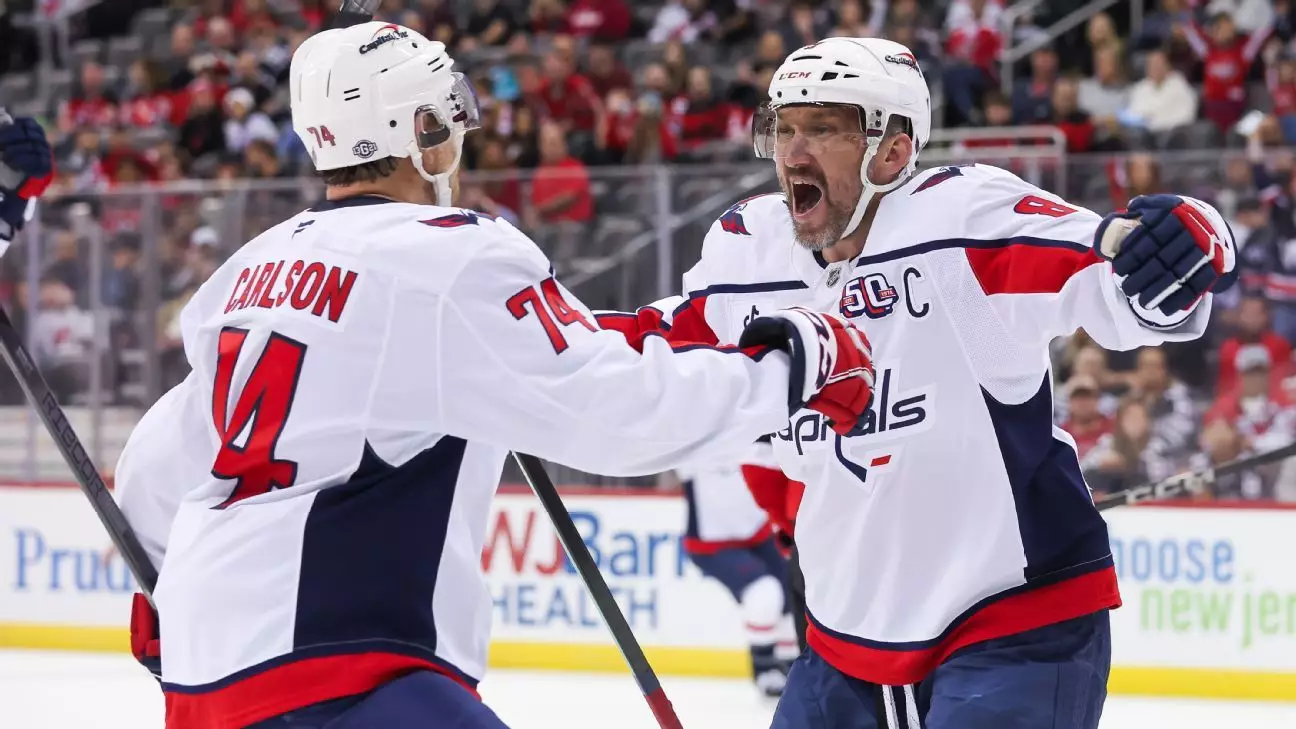Alex Ovechkin, the revered captain of the Washington Capitals, faces a daunting recovery journey after sustaining a fractured left fibula. This unfortunate injury is expected to sideline him for a period of four to six weeks, as announced by the team recently. Consequently, this setback interrupts Ovechkin’s relentless pursuit of an impressive milestone: breaking Wayne Gretzky’s all-time NHL goal record, currently standing at 894 goals. Ovechkin has amassed 868 goals thus far, making his quest to surpass Gretzky not only a personal ambition but a significant focal point for the Capitals and their fans alike.
With the Capitals currently holding the second position in the Metropolitan Division—just a point behind the Carolina Hurricanes—the timing of Ovechkin’s injury could not be more critical. As the season approaches its quarter-mark, the team must now recalibrate their strategy in light of his absence. The challenges posed by Ovechkin’s injury extend beyond mere statistics and encompass emotional and logistical ramifications on the roster.
Ovechkin is known for his resilience, having only missed 35 games in his two-decade career due to injuries. His teammates were left in disbelief at the news, reflecting a pervasive sentiment within the locker room. Tom Wilson, a long-time teammate, expressed this astonishment: „It’s unbelievable that he’s actually hurt.“ The peculiar nature of this injury mirrors the pain felt throughout the whole team, as they are forced to grapple with a future devoid of their most prolific scorer.
The incident responsible for the injury occurred during a collision in a game against Utah, which left Ovechkin in a walking boot, signaling the severity of the situation. In terms of rehabilitation, fibula fractures can be particularly stubborn, requiring not only time but also a gradual reintroduction to the game’s physicality. Veteran players like Jake DeBrusk have illustrated the challenges associated with similar injuries, noting that the mental hurdles involved in returning to the ice and regaining confidence in one’s physical capabilities are often as substantial as the physical recovery itself.
Ovechkin was on track for what could have been a career-best season, with projections of 68 potential goals. His absence will undoubtedly create a vacuum in offensive production. The ramifications of losing a player of his caliber extend beyond mere goal-scoring statistics—his presence on the ice often opens up space and opportunities for his teammates. His current scoring pace could have seen him break Gretzky’s record as early as late December or early January.
Seeking to fill the gap left by Ovechkin, head coach Spencer Carbery may consider reshuffling the lineup. A potential setup could place Connor McMichael, who has already scored 12 goals, on the top line alongside Pierre-Luc Dubois and Tom Wilson. This line adjustment will be crucial as the Capitals aim to maintain their impressive goal-scoring average of 4.33 goals per game. Despite being known for his scoring prowess, Dubois has only netted a single goal this season, which places additional pressure on him to step up during this critical period.
Ovechkin’s injury carries significant emotional weight for both the players and the coaching staff. The leadership group within the Capitals must foster an environment of resilience and motivation in Ovechkin’s absence. His teammates have consistently rallied around his aspiration to break historical records, fueling their collective energy throughout games. John Carlson’s observation about the risk of a hangover effect highlights the necessity for a cohesive response from the dressing room. Without Ovechkin’s charisma and determination as a driving force, will the remaining players be able to find the same competitive edge?
This scenario presents both a challenge and an opportunity for Washington. The Capitals must channel their energy into their gameplay without Ovechkin, ensuring they continue to fulfill their potential as a playoff contender. The need for emerging leaders to rise and fill the motivational void left behind is vital. If executed well, this could instill a newfound sense of purpose and unity within the team.
As the Capitals transition into a phase without their captain, questions loom about their ability to maintain momentum in the competitive landscape of the NHL. The next several weeks will serve as a litmus test for Washington, as they navigate Ovechkin’s absence while trying to pile on victories and maintain their position in the standings. Ultimately, while Ovechkin’s injury interrupts his historical chase, it also presents an opportunity for the Capitals to rally and show their resilience as a formidable team—even in the face of adversity.


Napsat komentář